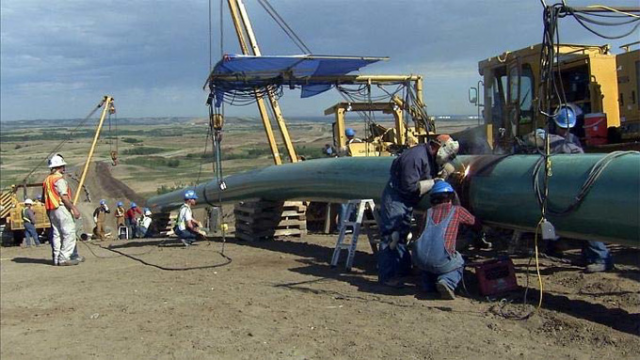Government Protectionism Kills North Dakota Pipeline Projects

Oil industry leaders – among them Harold Hamm, CEO of Continental Resources, in the interview above – have been calling for an end to federal restrictions on crude oil exports. Hamm argues that while the ban is great for oil refiners who have a largely captive domestic oil market from which to get oil these days, it’s bad for smaller oil producers who don’t have the option of selling to the international market.
“Petroleum is being exported,” Hamm said on CNBC. “There’s to limitation on exporting refined products. Basically, we’re just talking about crude oil, that you can’t export. So the big boys with refineries, they can export all of the petroleum products that they want to but the limitation is just on us small guys.”
That limitation is creating a headache in the area of transportation as well.
Per Dalrymple’s story, headlined “Despite need, some Bakken pipeline projects not viable,” two major oil pipeline projects have been canceled due to an inability to find purchasers for their oil. The problem? It’s about price uncertainty:
Each project had more than double the capacity for Bakken crude than the Keystone XL Pipeline, which North Dakota’s congressional leaders continue to urge President Barack Obama to approve. The Keystone XL would have the capacity for 100,000 barrels a day of Bakken crude from a terminal in Baker, Mont. TransCanada Corp. has firm commitments for up to 65,000 barrels a day, according to a U.S. State Department report released last week.
Justin Kringstad, director of the North Dakota Pipeline Authority, said the timing of the Koch and ONEOK projects, uncertainty of the market and the flexibility that rail offers shippers likely contributed to those projects being abandoned.
“We’ve got very different pricing depending upon which corner of the U.S. you go to,” Kringstad said. “That’s caused a lot of uncertainty and likely what has caused folks not to sign up for projects like Koch and ONEOK.”
This comes at a time when public concerns over derailments on overworked rail lines are, understandably, very high, and overburdened infrastructure in general is contributing to a major propane shortage in the upper midwest (which may have claimed at least one life).
This infrastructure is needed to take the burden off of roads and rails, but the market conditions aren’t necessarily right. What would help is an end to the trade restrictions to give oil producers – particularly those operating in North Dakota – a larger market to sell to. Domestic oil producers serving an expanded, more stable market would create more incentive for pipelines.




